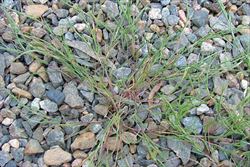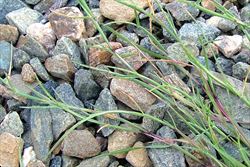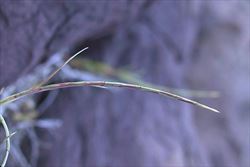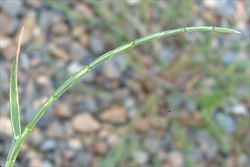Click on images to enlarge

infestation (Photo: Sheldon Navie)

habit (Photo: Sheldon Navie)

habit (Photo: Jackie Miles and Max Campbell)

stems and leaves (Photo: Sheldon Navie)

leaves and young seed-heads (Photo: Sheldon Navie)

close-up of upper leaf with large leaf sheath and small leaf blade (Photo: Sheldon Navie)

curved seed-head (Photo: Jackie Miles and Max Campbell)

close-up of seed-head (Photo: Sheldon Navie)
Scientific Name
Parapholis incurva (L.) C.E. Hubb.
Synonyms
Aegilops incurva L.Pholiurus incurvus (L.) Hitchc.
Family
Gramineae (South Australia)Poaceae (Queensland, New South Wales, the ACT, Victoria, Tasmania, Western Australia and the Northern Territory)
Common Names
coast barb grass, coast barb-grass, coast barbgrass, curly barbgrass, curly rye grass, curly ryegrass, curved hardgrass, curved sea hard grass, curved sea hardgrass, curved sicklegrass, sickle grass
Origin
Native to northern Africa (i.e. Algeria, Egypt, Libya, Morocco and Tunisia), the Madeira Islands, the Canary Islands, Europe (i.e. southern England, France, Portugal, Spain, Albania, Bulgaria, Greece, Italy, Yugoslavia and Ukraine), western Asia and the Indian sub-continent (i.e. north-western India and Pakistan).
Naturalised Distribution
Widely naturalised in southern Australia (i.e. in New South Wales, Victoria, Tasmania, South Australia and the southern and western parts of Western Australia).
Naturalised overseas in southern Africa, New Zealand, the USA, Central America, South America and the Caribbean.
Notes
Coast barbgrass (Parapholis incurva) is regarded as an environmental weed in New South Wales, Victoria, South Australia and Western Australia.

